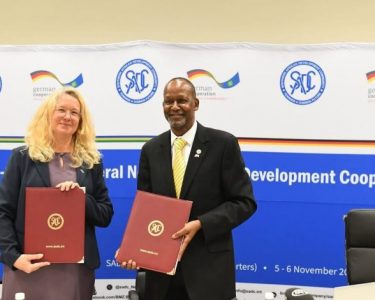
NAIROBI, May 31 (NNN-KBC) — The Government has launched a comprehensive initiative to enhance local production and processing of edible oils, with a particular focus on sunflower farming marking a major step in reducing Kenya’s heavy dependence on imports and spurring rural economic growth.
Speaking when she visited a cottage factory in Nambale, Busia County that is processing sunflower seeds into edible oils, Principal Secretary, State Department of MSMEs, Susan Mang’eni urged local stakeholders, farmers, cooperatives, agripreneurs, and SMEs to actively embrace the cultivation and processing of edible oil crops adding that it is a high-return sector.
“As Kenya continues to face a shortage of raw materials for edible oil processing resulting in billions spent annually on imports it is imperative that we turn to regions like Busia, which hold the right climate, fertile land, and vibrant farming communities, to lead this transformation,” she noted.
Adding that, “This is a high-return sector that not only promises enhanced household incomes but also positions Busia as a key contributor to national self-sufficiency in edible oil.”
With an estimated annual edible oil consumption of around 900,000 metric tonnes and domestic production contributing a mere 80,000 metric tonnes, Kenya spends between KSh 100 billion and KSh 160 billion annually on imports, making edible oils its second-largest import, after petroleum.
The efforts by government to revitalise the sector falls under the Bottom-Up Economic Transformation Agenda (BETA), which is designed to support micro, small, and medium-sized enterprises (MSMEs), encourage value addition, and promote food security and rural development.
One promising example is the sunflower oil processing cottage factory established by Daljeet Wirk Food Processors in Nambale, Busia County.
During a recent visit to the site, the Principal Secretary praised the facility’s dual-impact model, which produces cooking oil for human consumption and repurposes waste as chicken feed, generating an additional income stream.
“Daljeet Wirk Food Processors is a good example of how integrated approaches combine processing with small-scale farming can boost food security, create jobs, and build a resilient local economy,” she said.
Accompanied by GIZ’s Dr. Christoph Zipfel and county leaders, PS Mangeni highlighted the initiative as a practical example of BETA in action.
The Government is actively facilitating access to certified sunflower seeds through organised farmer groups in every ward. To ensure maximum productivity, each ward must mobilise at least 800–1,000 farmers.
Furthermore, successful wards will benefit from the installation of sunflower pressing machines, which streamlines the conversion of seeds into oil and enhances local value chains.
Other Government agencies are also playing a critical role. During the Open Week exhibition in Kabete, Kiambu County, Kenya, the Kenya Agricultural and Livestock Research Organisation (KALRO) chairman, Dr. Thuo Mathenge, announced a plan to engage at least 200 young people in each of Kenya’s 47 counties in sunflower cultivation.
This strategy not only boosts oilseed production but also addresses youth unemployment, offering a meaningful and sustainable livelihood.
He noted that sunflower farming holds immense potential not only to cut Kenya’s oil import bill but also to empower rural communities, especially women and youth adding that with the proper support infrastructure, access to inputs, and guaranteed markets through public-private partnerships, sunflowers could become a reliable source of income across Kenyan counties. — NNN-KBC





